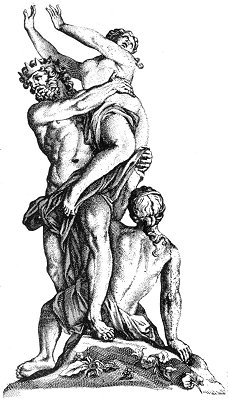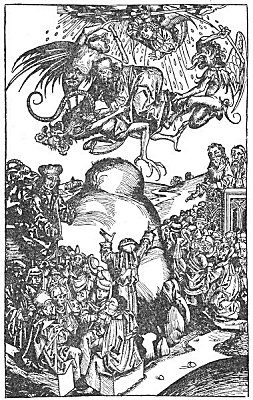Two years after his flight, Weishaupt most daringly asserts, that the Systems of his Illuminism (as published by the civil powers) are but a mere sketch, a plan as yet too ill-digested for the public to form any judgment either on him or his adepts, from the Original Writings or his Confidential Correspondence. He publishes a new Code, and calls it The corrected System of Illuminism, with its Degrees and Constitutions, by Adam Weishaupt, Counsellor to the Duke of Saxe Gotha. Here at least we have a right to judge him and his mysteries, both in his apology and his corrected degrees. But the reader will now view him in a new light. He is not only the conspiring infidel, but the insolent Sophister, insulting the Public with all the haughtiness of the most daring Atheist, shrugging his shoulders in disdain at the rest of mankind, and with impertinent pity saying to us all, as he did of the adepts whom he had duped, poor creatures! what could one not make you believe!
I deign to cast my eyes on this apology, or the Illuminism corrected. He begins by telling us, that to have supposed him capable of composing so extensive a work in two years was doing him the honour of supposing him gifted
p. 506
with most extraordinary talents; and it is in such terms that the Sophister informs the public that he takes them for great fools. Let the contempt with which he treats his readers be retorted upon himself; let neither him nor his accomplices expect to descend to posterity with any other distinction than as the phenomena of vice and infamy. Are we to crouch in token of homage before the men who insolently scoff at their God and at the public weal? I know not whether Weishaupt needed extraordinary talents or not, though I grant him all the art and cunning of the Sophister; but most certainly he must have presumed much on the force of impudence when he flattered himself that the public would inevitably find that his corrected Code contained no principles but such as would elevate the mind and tend to form great men. 10 What I find is, that it is nothing more than a medley of all the arts of his original Code for the education or rather depravation of his Adepts. Did I wish to form a stupid atheist, this would be the work I should chuse to put into his hands. As early as the third degree, in place of a God reigning as freely as he does powerfully over this universe, I find the universe transformed into a vast machine, in which every thing is held together or put in motion by I know not what fatality, decorated sometimes by the appellation of God, at other of nature. Again: did I wish to decorate with the name of providence a destiny which cannot annihilate a single atom without depriving the stars of their support and involving the whole universe in ruin, this would be the work I should recommend: I would give it to the narrow-minded adept, who, in a world where every thing is said to be necessary, should still pretend to talk of virtue or vices, or who could comfort himself for all the harm which the wicked could do him, by learning that the wicked like the virtuous man only followed the course which nature had traced for him; and that they would both arrive at the same point as himself In fine, I would put it into the hands of the imbecile, who would call the art of making merry the art of being always happy (ars semper gaudendi); the art of persuading oneself that one’s misfortunes are incurable, or that they are all necessary. 11 But what reader will brook the impudence of that conspiring infidel, who, dedicating his mysteries as an apology to the whole world and all mankind—der welt and den menschlichen geschlecht—and pretending to prove that his original mysteries are not a conspiracy against Religion, puts a discourse in the mouth of his new Hierophants, whose very title characterizes the most determined one both against God and Religion; he calls it, An Instruction for the adepts who are inclined to the fancy of believing in or of adoring a God! I know it may be also translated, An instruction for the Brethren inclining toward Theosophical or Religious enthusiasm. 12 But if both these translations be not synonymous in the language of the Sophisters, let the reader judge, from the exordium of the discourse, which is the most accurate.

Moe is the founder of GnosticWarrior.com. He is a father, husband, author, martial arts black belt, and an expert in Gnosticism, the occult, and esotericism.



